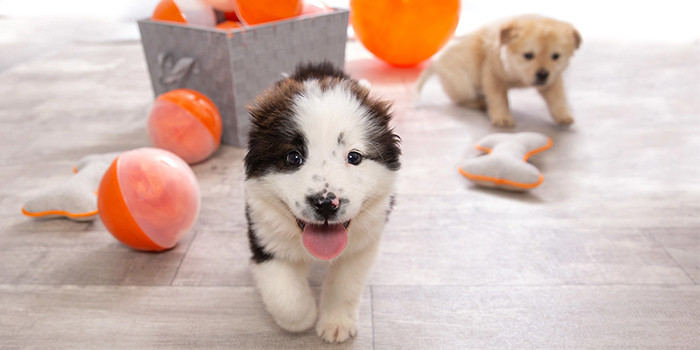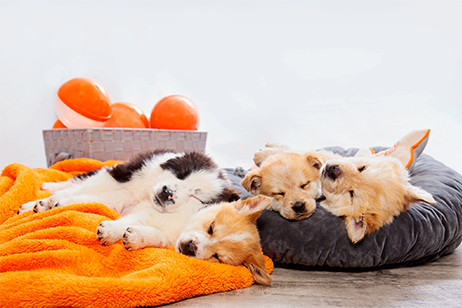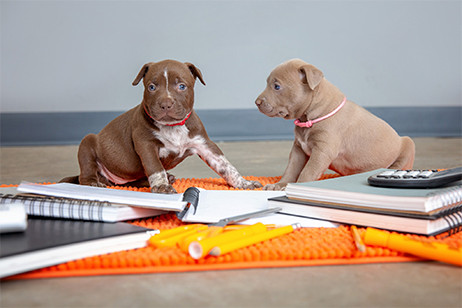Evo Italian Restaurant
- 561-745-2444
- email us
- Jupiter, Florida, United States

March 22, 2021 - Jupiter, FL - They’re fluffy, floppy and adorable. Their tiny toes are tender, pink and perfect. Even their breath smells magical. Seriously, what’s not to love about puppies?
As irresistible as they are, puppies do grow up quickly, and they need our help growing into equally lovable adult dogs. Since March 23 is National Puppy Day, what better time to talk about the importance of training and socializing all those pandemic pups?
We know that more than a million pets have been adopted from shelters and rescue groups in the year since the start of the pandemic. But additionally, an untold number of puppies have been purchased since last March, which could spell trouble for first time pup parents. According to the American Pet Products Association’s COVID pulse surveys, as of the end of 2020, 10% of respondents indicated they had gotten a new pet as a result of the pandemic, representing more than 12 million households. While the data is not separated by species, even after subtracting the adult dogs, cats and kittens, there is inevitably a huge number of new puppies in homes in the last year.
Many shelter pets tend to be past the puppy stage, and generally come with some support from the shelter, informally in the form of advice, or formally by way of obedience classes. Puppies purchased from pet stores or online retailers, and even some breeders, are often only weeks old, most barely weaned, and usually do not come with any follow up support, leaving pet parents on their own in terms of training.
So now that months have passed, those sweet little fuzzy fellows are turning into dog-sized critters with adolescent behaviors. Dogs need training and socialization to learn how to be healthy and happy members of the family, and that responsibility falls on owners. Without an investment in training, dogs can grow up to be wild, unruly pets with no manners, and families often feel exasperated by them at this stage because training a full-grown puppy who jumps on everyone, scratches and is mouthy, may feel like too much trouble.

To help keep dogs who were once small and adorable, but are now larger and less manageable out of shelters, new pet owners should take advantage of this time to find creative ways to ensure their pups get the training and socialization they need, even amid the pandemic.
Dog training may look different during COVID, but there are still plenty of options out there. Puppy parents can register their pets in private or socially-distanced group obedience classes, or find trainers offering courses on Zoom. Best Friends Animal Society has a variety of dog training videos online, from clicker and crate training, to puppy socialization, basic obedience, and working through leash-reactivity. Getting dogs and puppies out to socialize, to facilitate exposure to other dogs and to safely meet new people, can be accomplished with a long leash on walks or at dog parks.
Marissa Sunny, CPDT-KA and senior dog lifesaving specialist at Best Friends Animal Society offers some advice to new pup parents:
“Whether you purchased a puppy from a breeder or adopted a puppy from your local shelter or rescue group, it is incredibly important to start training right away. While some behaviors may seem cute when the puppy is small, like jumping up to greet you or mouthing on your fingers, these behaviors can quickly become unmanageable in an adult dog. Dogs are extremely smart--smarter than we give them credit for most of the time --because of this they will likely train you faster than you can train them, so it’s best to get started right away.”

As Sunny pointed out, dogs have no internal moral compass; they actually don't know when they did something wrong unless you teach them otherwise. “Dogs view things in two categories: safe or dangerous, not good or bad. When your puppy becomes a teenager, and then an adult, they will continue the same ‘cute’ behaviors they started in puppyhood, but it is very different when it is an 80 pound dog jumping on your elderly mother or mouthing your kids' fingers,” she said.
Sunny offered an example what happens when a dog grows up without training by way of a dog named Treat, who came to the Best Friends Lifesaving Center in Los Angeles recently.
“Treat is an absolute sweetheart, but he had no idea how big he was. He would incessantly jump up on staff members and volunteers as well as hard mouth on anyone or anything that gave him a chance. We don't know exactly how or why he ended up at the city shelter, but I suspect this behavior had something to do with it,” she said. “He was a young adult shepherd mix with a lot of energy to burn and nowhere productive to channel it. After working on relaxation protocol, basic training, and letting him work off his energy in the yard and playing with other dogs he found his forever family with a young family and another juvenile shepherd as a brother.”
Most people are still home more than usual, and it’s important to spend time working with pets now, while also preparing them for more alone time, as people eventually go back to work, school and traveling.
An investment now in training and socialization will pay off in the form of improved communication and expectations between pets and people, and a better-behaved, well-mannered pet who is a happier, healthier member of the family.